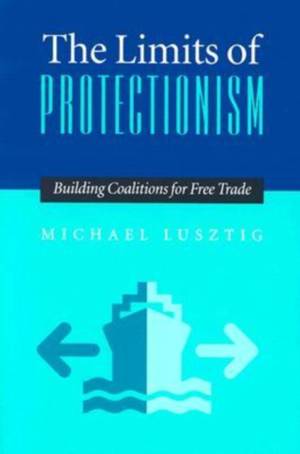
Je cadeautjes zeker op tijd in huis hebben voor de feestdagen? Kom langs in onze winkels en vind het perfecte geschenk!
- Afhalen na 1 uur in een winkel met voorraad
- Gratis thuislevering in België vanaf € 30
- Ruim aanbod met 7 miljoen producten
Je cadeautjes zeker op tijd in huis hebben voor de feestdagen? Kom langs in onze winkels en vind het perfecte geschenk!
- Afhalen na 1 uur in een winkel met voorraad
- Gratis thuislevering in België vanaf € 30
- Ruim aanbod met 7 miljoen producten
Zoeken
€ 83,95
+ 167 punten
Omschrijving
Conventional wisdom holds that free trade is economically beneficial to nations. But this does not prevent industries and interest groups from lobbying their governments for protection, which creates a fear of electoral backlash among politicians hoping to promote free trade. The Limits of Protectionism demonstrates how governments can attain those economic benefits while avoiding the political costs.
Michael Lusztig\u2019s theoretical model focuses on a process by which protectionists can be pushed to restructure and compete in a global economy. In this process, a small cutback in domestic protection leads to lost market shares at home; producers must then turn to overseas exports, and, as the size of foreign profits grow, former protectionists become active advocates for more and greater free trade opportunities.
In a wide-ranging array of case studies--from nineteenth-century Britain to Depression-era United States to contemporary New Zealand, Australia, Brazil, Canada, Chile, and Mexico--Lusztig reveals that, if skillfully handled, governments can eliminate the obstacles to free trade and enjoy continued economic growth without fear of protectionist groups seeking revenge at the ballot box.
Michael Lusztig\u2019s theoretical model focuses on a process by which protectionists can be pushed to restructure and compete in a global economy. In this process, a small cutback in domestic protection leads to lost market shares at home; producers must then turn to overseas exports, and, as the size of foreign profits grow, former protectionists become active advocates for more and greater free trade opportunities.
In a wide-ranging array of case studies--from nineteenth-century Britain to Depression-era United States to contemporary New Zealand, Australia, Brazil, Canada, Chile, and Mexico--Lusztig reveals that, if skillfully handled, governments can eliminate the obstacles to free trade and enjoy continued economic growth without fear of protectionist groups seeking revenge at the ballot box.
Specificaties
Betrokkenen
- Auteur(s):
- Uitgeverij:
Inhoud
- Aantal bladzijden:
- 272
- Taal:
- Engels
Eigenschappen
- Productcode (EAN):
- 9780822958437
- Verschijningsdatum:
- 25/07/2004
- Uitvoering:
- Paperback
- Formaat:
- Trade paperback (VS)
- Afmetingen:
- 152 mm x 228 mm
- Gewicht:
- 390 g

Alleen bij Standaard Boekhandel
+ 167 punten op je klantenkaart van Standaard Boekhandel
Beoordelingen
We publiceren alleen reviews die voldoen aan de voorwaarden voor reviews. Bekijk onze voorwaarden voor reviews.









